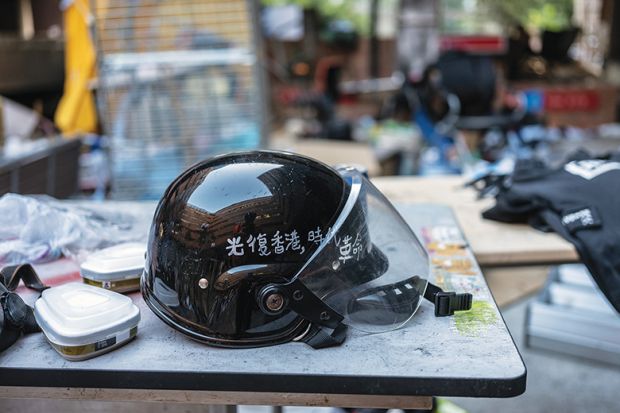Hong Kong universities are working through the winter break to restore both their facilities – and their reputations – before they fully reopen in January.
After months of anti-government demonstrations, universities are still in various states of disrepair, with in-person classes suspended for the term and security checks installed at entrances. Administrators are making an effort to reassure parents and students – particularly those who fled overseas – that Hong Kong is still safe and welcoming.
The University of Hong Kong posted photos of its president, Xiang Zhang, and vice-president, Ian Holliday, greeting students when campus operations resumed.
Professor Holliday told Times Higher Education that “in the past three weeks the situation on campus has been calm and quiet. This is partly because the wider situation in Hong Kong has improved considerably” and also because HKU hired 200 more security personnel.
“We are confident that the situation on campus is safe and secure, and that the environment for teaching and learning is back to the levels to which we have long been accustomed,” he said.
Among other challenges, Hong Kong universities face enormous repair bills, at a time when government funding requests have stalled.
City University of Hong Kong said that reconstruction will cost hundreds of millions of Hong Kong dollars. The costs at the Chinese University of Hong Kong and Hong Kong Polytechnic University will likely be higher, as those two campuses were the sites of violent clashes between police and masked protesters, many of whom turned out not to be their students at all.
“The series of conflicts and incidents on campus presented serious hardship for all members of the university, which could in fact last for some time to come,” Rocky Tuan, CUHK’s president, wrote after leaving hospital following treatment for inhaling teargas as he tried to mediate between protesters and police.
“It is my earnest desire to stand firm with all CUHK members and work together to rebuild our beautiful campus and great university.”
A CUHK spokeswoman told THE that all departments had “resumed normal operations” and that most of the campus was reopened, with the exception of areas near damaged transport infrastructure.
However, others warned that the mental scars of the clashes would take much longer to heal, if ever.
“Physical recovery is easy. Psychologically, I’m afraid it can never recover,” Simon Shen, founder of international relations firm Glocal Learning Offices, told THE.
Professor Shen, who has taught at CUHK and HKU, said he was concerned about “diminished trust between teachers and students, and different groups of students”.
John Burns, emeritus professor at HKU, said the city’s universities would only heal when the broader community did.
“Universities are embedded in society. This is especially true because our universities are public. And, because of this, conflicts in society are brought into the university,” he said.
“Without a resolution in conflicts – political, economic and social – it will be difficult for universities, on their own, to solve these problems.”
Professor Burns noted that one of the protesters’ slogans implied that “we will never return to normalcy”, meaning they did not want to go back to the problems that existed before the demonstrations.
“We need to pay careful attention to that,” he said. “University leadership needs to address these issues carefully, emphatically, and try to understand students. And it should be the other way around, too.”






